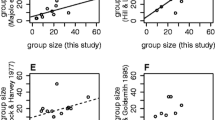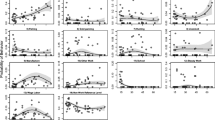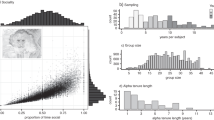Abstract
InJ. Altmann's review of methods used to sample spontaneously occurring social behavior, the one-zero method, which has a history of over 40 years of use with human and animal research, was severely criticized and was the only technique for which no use whatsoever was recommended. Substantial justification for this recommendation would raise serious questions about widely cited primate research from laboratories at Cambridge, Wisconsin, and elsewhere, where one-zero sampling has been often used.Altmann's nonempirical consideration of one-zero sampling is based upon assumptions which are sometimes unnecessarily limiting or probably incorrect and which are not supported by any data. An empirical comparison of one-zero sampling with two techniques considered useful byAltmann reveals contradictions in her recommendations and suggests that the one-zero method is a convenient way to combine the actual rate and duration of a spontaneously occurring behavior into a single index of social relatedness.
Similar content being viewed by others
References
Altmann, J., 1974. Observational study of behavior: sampling methods.Behaviour, 49: 227–267.
Hendy-Neely, H. &R. J. Rhine, 1977. Social development of stumptail macaques (Macaca arctoides): momentary touching and other interactions with adult males during the infants' first 60 days of life.Primates, 18: 589–600.
Hinde, R. A., 1971. Development of behavior. In:Behavior of Nonhuman Primates, vol. 3.,A. M. Schrier &F. Stollnitz (eds.), Academic Press, New York, pp. 1–68.
————, 1972.Social Behavior and Its Development in Subhuman Primates. Univ. Oregon Books, Eugene.
————,T. E. Rowell, &Y. Spencer-Booth, 1964. Behaviour of socially living rhesus monkeys in their first six months.Proc. zool. Soc. Lond., 143: 609–649.
———— &Y. Spencer-Booth, 1967. The behavior of socially living rhesus monkeys in their first two and a half years.Anim. Behav., 15: 169–196.
———— & ————, 1968. The study of mother-infant interaction in captive group-living rhesus monkeys.Proc. Roy. Soc., Lond., 169: 177–201.
Leger, D., 1977. An empirical evaluation of instantaneous and one-zero sampling of chimpanzee behavior.Primates, 18: 387–393.
Mitchell, G. D., 1968. Intercorrelations of maternal and infant behaviors inMacaca mulatta.Primates, 9: 85–92.
Rhine, R. J., 1972. Changes in the social structure of two groups of stumptail macaques (Macaca arctoides).Primates, 13: 181–194.
————, 1973. Variation and consistency in the social behavior of two groups of stumptail macaques (Macaca arctoides).Primates, 14: 21–35.
————, &C. Kronenwetter, 1972. Interaction patterns of two newly formed groups of stumptail macaques (Macaca arctoides).Primates, 13: 19–33.
Rosenblum, L. A. &C. I. Kaufman, 1967. Laboratory observations of early mother-infant relations in pigtail and bonnet macaques. In:Social Communication among Primates,S. A. Altmann (ed.), Univ. Chicago Press, Chicago, pp. 33–44.
Author information
Authors and Affiliations
About this article
Cite this article
Rhine, R.J., Flanigon, M. An empirical comparison of one-zero, focal-animal, and instantaneous methods of sampling spontaneous primate social behavior. Primates 19, 353–361 (1978). https://doi.org/10.1007/BF02382803
Received:
Accepted:
Issue Date:
DOI: https://doi.org/10.1007/BF02382803




